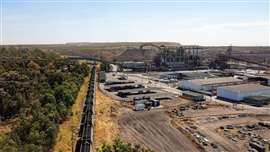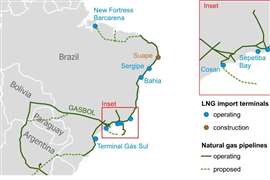Consortium launches study to develop carbon capture hubs in Asia
August 11, 2025
BHP, Chevron, Mitsui & Co. among those involved
A multinational consortium of steelmakers, energy companies and industrial partners has launched a pre-feasibility study to assess the potential for Carbon Capture, Utilisation and Storage (CCUS) hubs across Asia.
Participants include ArcelorMittal Nippon Steel India (AM/NS India), JSW Steel, Hyundai Steel, BHP, Chevron, Mitsui & Co., Ltd. and other value chain participants. According to the consortium, the initiative is the first independent, industry-led CCUS hub study in Asia and will examine technical and commercial pathways to deploy the technology in hard-to-abate sectors such as steelmaking.
The study will explore opportunities for large-scale projects that can repurpose or store captured carbon dioxide (CO₂), using shared infrastructure to reduce costs and improve efficiency. Captured CO₂ could be used in industrial processes or transported by pipeline or ship to storage sites in Asia or Northern Australia.
 The Blackwater coal mine in Queensland, Australia, part of the BHP Mitsubishi Alliance (BMA). An industry consortium comprised of leading steelmakers ArcelorMittal Nippon Steel India, JSW Steel, Hyundai Steel Company and other value chain players, BHP, Chevron, Mitsui & Co., Ltd. (the Consortium), are undertaking a pre-feasibility study to assess the development of Carbon Capture, Utilization and Storage (CCUS) hubs across Asia.(Image: BHP)
The Blackwater coal mine in Queensland, Australia, part of the BHP Mitsubishi Alliance (BMA). An industry consortium comprised of leading steelmakers ArcelorMittal Nippon Steel India, JSW Steel, Hyundai Steel Company and other value chain players, BHP, Chevron, Mitsui & Co., Ltd. (the Consortium), are undertaking a pre-feasibility study to assess the development of Carbon Capture, Utilization and Storage (CCUS) hubs across Asia.(Image: BHP)
Each participant is expected to be involved in at least one hub, with the study delivering conceptual development strategies, cost and schedule estimates, and potential commercialisation pathways. Non-technical factors, including regulatory and cross-border transport requirements, will also be assessed.
Hatch will serve as Project Management Officer, collaborating with the Global CCS Institute, McDaniel and Pace CCS. The study is open to additional members and is expected to conclude at the end of 2026, with results to be shared publicly to promote industry learning and inform policy development.
The consortium is targeting the economies of scale needed to make CCUS a viable decarbonisation tool in Asia, where a large portion of steelmaking capacity is still early in its operational life. By aggregating captured CO₂ into regional hubs, the group aims to optimise costs, support economic utilisation, unlock solutions for multiple industries and distribute financial and operational risks among participants.
BHP Vice President Marketing Sustainability Ben Ellis said that with more than 1 billion tonnes of steel produced annually in Asia, mostly from blast furnaces, it is essential to find ways to decarbonise existing assets while new commercial pathways develop. “By leveraging shared knowledge and resources with our partners, we are investing in innovative solutions—like the potential of CCUS—that we see as an essential part of decarbonising hard-to-abate sectors such as steelmaking,” he said.
AM/NS India Chief Sustainability Officer Arvind Bodhankar emphasised the consortium’s role in shaping industrial responsibility. “The choices we make today will fundamentally shape the next generation, far more than our own,” he said. “This shared vision will enable pioneering initiatives to decarbonise steelmaking and set new benchmarks in industrial practices, accelerating India’s journey toward net zero.”
JSW Group Chief Sustainability Officer Prabodha Acharya said CCUS must become financially viable to achieve near-zero emissions in the steel sector. “We aim to reduce our CO₂ emission intensity in steelmaking by 42% by 2030 from a 2005 baseline, and achieve net neutral carbon emissions by 2050,” he said, noting that JSW has already achieved a 30% reduction.
Hyundai Steel Vice President Yonghee Kim said the consortium represents “real and measurable emissions reductions” beyond conventional technology development. “We will continue to lead in low-carbon technologies, including CCUS, contributing to the industry’s sustainability,” he said.
Chevron Australia Lower Carbon Execution General Manager David Fallon said: “Chevron believes in the critical role CCUS can play in a lower carbon world, including by reducing carbon emissions in the hard-to-abate sectors. We are focused on leveraging our expertise and global reach to advance CCS technologies and scale lower carbon solutions across the value chain, with a focus on areas including the hard-to-abate sector.”
Mitsui COO Masaya Inamuro said the company is targeting a 30% emissions reduction by 2030 compared to 2020 levels. “This initiative aims to explore viable pathways for large-scale CO₂ reduction and lay the groundwork for future deployment of decarbonisation solutions,” he said.
MAGAZINE
NEWSLETTER

CONNECT WITH THE TEAM









